- Home
- Philip Pullman
The Shadow in the North Page 4
The Shadow in the North Read online
Page 4
His hair was slicked down, and a pair of owlish glasses sat oddly on his broken nose. Jim, interested despite himself, carried a small brass-bound box and a battery case, and grumbled all the way to Streatham about the weight.
By seven o'clock Mrs Jamieson Wilcox's front parlour was crowded: twelve people packed in like dates, hardly able to move. All the smaller items of furniture had been moved out for the occasion, but that still left a substantial table, a piano, three armchairs, a laden what-not and a sideboard on which a black-draped portrait of the late Mr Jamieson Wilcox was kept company by a solemn pineapple.
The room was warm, not to say hot. The gaslights on the ornamental brackets were turned up high, and a coal fire burned in the grate. The assembled spiritualists put out a good deal of fleshly heat themselves, fortified by the meat tea they had consumed earlier, and the odours of tinned salmon, cold tongue, potted shrimps, beetroot and blancmange lingered heavily in the air. There was a good deal of brow-mopping and fanning, but no one would have considered for a moment removing a jacket or loosening a tie.
The meeting proper was due to start at half-past seven, and as the time drew near a stout and commanding gentleman opened his watch and coughed loudly to attract everyone's attention. This was Mr Freeman Humphries, retired draper and Chairman of the League.
"Ladies and gentlemen!" he began. "Friends and comrades in the search for truth! Let me begin on your behalf by proposing a vote of thanks to Mrs Jamieson Wilcox for the substantial and delicious repast we have just enjoyed." (Murmurs of assent.) "Next, may I welcome Mrs Budd, the well-known medium and clairvoyant, whose messages so impressed and consoled us on her last visit." He turned and bowed slightly to a plump, dark woman with a roguish eye, who smiled back at him saucily. He coughed again and shuffled his notes. "And finally, I am sure you would all like to make the acquaintance of Dr Herbert Semple and his associate, of the Royal Institution. I call upon Dr Semple, then, to explain the purpose of this meeting tonight, and to say something about his researches."
This was Frederick's cue. He stood up and looked around the crowded room, at the shopkeepers and clerks and their wives, at the pallid young man with the sniff and the pallid young woman with the jet necklace, at Mrs Budd the medium (whose eyes travelled admiringly down his frock-coated form), at Mrs Jamieson Wilcox, at the pineapple.
"Thank you, Mr Humphries," he began. "Capital tea, Mrs Wilcox. First-rate. Well, ladies and gentlemen, I'm very grateful to you for inviting me. My assistant and I have been interested for some time in the investigation of the trance state, particularly in relation to the electrical conductivity of the skin. This box -" Jim lifted it on to the table, and Frederick opened it to disclose a copper coil, a mass of twisted wire, brass terminals and a large glass dial - "is an improved version of the Electro-Dermograph, invented by Professor Schneider of Boston."
He passed a length of wire to Jim to connect to the batteries, and then uncoiled four more lengths, each ending in a little brass disc. They were all connected to the copper coil.
"These wires are attached to the medium's ankles and wrists," he explained, "and the resistance is shown on the dial. Mrs Budd may we connect you up?"
"You can connect me to your apparatus any time, dear," she said brightly.
Frederick coughed. "Ahem. . . Good. Could one of the ladies perhaps oblige by fastening the wires to Mrs Budd's ankles? It's a delicate matter, I know. . ."
But Mrs Budd was having nothing to do with delicacy.
"Oh, no," she said, "you do it, love, so's I don't get electrified. Besides, you've got the gift, haven't you? I knew it as soon as I saw you, dear - you've got spirituality shining out of you."
"Oh," said Frederick, aware that Jim was grinning widely at him. "Well, in that case. . ."
Trailing wires, he plunged beneath the tablecloth, while the ladies and gentlemen of the Spiritualist League, caught between the impropriety of a young man's actually touching a pair of female ankles and the evident spirituality of both parties, coughed and talked and looked genteelly elsewhere. After a minute Frederick emerged and pronounced the wires attached.
"And very gentle you done it, too," said Mrs Budd. "I hardly knew you was touching me. Such artistic fingers!"
"Well," said Frederick, delivering a sharp kick to Jim's ankle, "shall we try the apparatus?"
He threw a switch, and the needle sprang away from the stop and trembled at the centre of the dial.
"Fancy that," said Mrs Budd. "It doesn't even tingle."
"Oh, there's no danger, Mrs Budd; the current is very mild. Now, ladies and gentlemen, shall we take our places at the table?"
Chairs were drawn up, and the spiritualists and their guests jammed themselves as comfortably as they could around the table. Frederick sat on one side of Mrs Budd with the Electro-Dermograph in front of him and, before he could escape, Jim was seized in a strong, beringed hand and planted firmly on the other.
"Lights, Mrs Wilcox, if you please," said Mr Freeman Humphries, and the hostess turned down the gaslights one by one before taking her place. Only the faintest glow now filtered down. A hush fell over the company.
"Can you see your apparatus, Dr Semple?" inquired a spectral voice.
"Perfectly, thank you. The needle is coated with luminous paint. Ready when you are, Mrs Budd."
"Thank you, dear," she said placidly. "Join hands, ladies and gentlemen."
Hands felt for one another and lay palm to palm around the edge of the table. The circle was joined. Frederick peered down at the box, his right hand folded in Mrs Budd's warm, moist one, his left clutching the bony fingers of the pallid girl on his other side.
Silence fell.
After a minute, Mrs Budd gave a long, shuddering sigh. Her head had fallen forward and she seemed to be slumbering. Suddenly she woke up and began to speak - in a man's voice.
"Ella?" she said. "Ella, my dear?"
It was a rich voice, a fruity voice, and more than one person in the circle felt the hairs prickle on their neck in response. Mrs Jamieson Wilcox started and said faintly:
"Oh! Charles - Charles! Is it you?"
"It is indeed I, my dear," answered the voice - a man's voice, a voice no woman could imitate, a voice with sixty-seven years of port and cheese and raisins in it. "Ella, my dear, though the veil has parted us, let not our love grow cold. . ."
"Oh, never, Charles! Never!"
"I am with you night and day, my dear. Tell Filkins in the shop to mind his cheese."
"Mind the cheese - yes -"
"And pay heed to our boy, Victor. I fear he may be falling in with low companions."
"Oh, dear! Charles, what can I -"
"Fear not, Ella. The blessed light is shining - the golden land beckons, and I must depart - remember the cheese, Ella. Filkins is not sufficiently careful with his napkins. I go. . . I depart. . ."
"Oh, Charles! Oh, Charles! Farewell, beloved!"
A sigh, and the spirit of the grocer departed. Mrs Budd shook her head as if to clear it; Mrs Jamieson Wilcox wept discreetly into a black-edged handkerchief, and then the circle was resumed.
Frederick looked around. In the dimness it was impossible to make out anyone's features, but the atmosphere had changed: people were excited now, tense with expectation and ready to be convinced. This woman was good. Frederick had no doubt she was faking, but he hadn't come here to listen to dead grocers talk about cheese.
And then it happened.
Mrs Budd gave a convulsive little shudder, and began to talk in a low voice - her own voice, this time, but brimming with fear and horror.
"The spark. . ." she said. "There's a wire, and the counter going round - hundred and one, hundred and two, hundred and - no, no, no. . . Bell. Bells. The bell man. Such a pretty ship, and the little girl dead. . . It isn't Hopkinson, but they're not to know. No. Keep it in the shadows. Sword in the forest - oh, blood on the snow, and the ice - he's still there, all in a glass coffin. . . The regulator. Three hundred pounds - four hundred - N
orth Star! There's a shadow in the north . . . a mist all full of fire - steam, and it's packed with death, packed in pipes - steam pipes - under the North Star - oh, horrible. . ."
Her voice trailed away, with infinite sadness, into silence.
This was what Frederick had come to hear and, though he didn't understand it, her tone made his flesh creep. She sounded like someone in the toils of a nightmare.
The other spiritualists sat with reverent attention. No one moved. But then, with a loud sigh, Mrs Budd woke up, and took charge again.
A loud chord resounded from the piano. Everyone jumped, and the three silver-framed photographs on the top vibrated in sympathy.
A furious rapping came from the centre of the table. Heads jerked in surprise, only to be lifted upwards towards a pale tremulous glow that was materializing on the ceiling. Mrs Budd, eyes closed, seemed to be at the centre of an invisible storm. Frederick was aware that she was controlling it all, but it was still impressive: the curtains waved - the strings of the piano jangled wildly - and then the heavy table under its damask cloth began to heave and sway like a boat on a surging sea. A tambourine on the mantelpiece jingled once and then fell with a crash into the hearth.
"A physical manifestation!" cried Mr Humphries. "Keep still, everyone! Observe the phenomena! The spirits will not harm us--"
But evidently the spirits had other intentions regarding the Electro-Dermograph, because there was a sudden blinding flash from it, with a loud crack and a smell of burning. Mrs Budd cried out in alarm, and Frederick leapt up hastily.
"Lights! Lights, if you please, Mrs Wilcox!"
As the hostess, in all the confusion, turned up the nearest gaslight, Frederick bent over the medium, unfastening the wires from her wrists.
"Wonderful result!" he was saying. "Mrs Budd, you've surpassed all my expectation! An unparalleled reading - you're not hurt? No, of course you're not. Machine's broken, but that doesn't matter. Couldn't take the reading! Went right off the dial! Marvellous!"
Beaming with triumph, he nodded at the bewildered spiritualists, who were blinking in the light. Jim disconnected the wires from the battery, while Mrs Budd rubbed her wrists.
"Sorry and all that, Mrs Wilcox," Frederick went on. "Didn't want to break up the seance, but, d'you see, this is scientific proof! When I publish my paper, this meeting of the Streatham and District Spiritualist League will be seen to mark a turning point in the history of psychical research. No, that wouldn't surprise me at all. Wonderful result."
Gratified by this, the circle broke up; and Mrs Jamieson Wilcox, whose nature turned automatically to sustenance at moments of crisis, suggested a nice cup of tea all round. It was soon brought in; Mrs Budd was surrounded by a small group of admirers, and Frederick and Mr Humphries conversed earnestly by the fire while Jim packed the Electro-Dermograph away, with the help of the prettiest girl in the room.
Presently some of the guests rose to leave, and Frederick rose with them. He shook hands all round, detached Jim from his girl, and paid a specially appreciative tribute to Mrs Budd before leaving the house.
A thin, nervous, middle-aged man left at the same time, as if by chance, and walked with them towards the station. As soon as they turned a corner Frederick stopped and took off his glasses.
"That's better," he said, rubbing his eyes. "Well, Mr Price. Is that what you expected? Does she always do that?"
Mr Price nodded. "I'm sorry about your machine," he said. He had the air of being sorry about most things.
"Nothing to be sorry about. What d'you know about electricity?"
"Nothing at all, I'm afraid to say. . ."
"Nor do most people. I could wire this box up to a cucumber and tell 'em it contained the soul of their Uncle Albert, and if the needle jumped they'd never know the difference. No, this is a camera."
"Oh! But I thought you had to have chemicals and all sorts. . ."
"Used to with the old wet-collodion plates. Had to slap the stuff on fresh every time. This is loaded with a gelatine plate - new invention. Much more convenient."
"Ah. . ."
"And the flash was deliberate. Can't take photographs in the dark. I look forward to seeing Nellie Budd up to her tricks when I develop the plate. . . But that stuff about sparks and shadows and the North Star. That was different."
"Indeed, Mr Garland. That was what alarmed me in the first place. I've seen Mrs Budd four times now, and each time she's gone into a trance like that, quite different from the rest of the performance, and she's come out with details of matters I know about in the City - financial dealings, things like that - highly confidential, some of them. It's inexplicable."
"Did you recognize any of that stuff tonight? Who's this Hopkinson, for instance?"
"That name means nothing to me, Mr Garland. Her colloquy was dark and obscure tonight. Only the business about the bells, and North Star. . ."
"Well?"
"She said 'the bell man', if you remember. Well, that's the name of my employer - Mr Bellmann. Axel Bellmann, the Swedish financier. And North Star is the name of a new company he's formed. What I fear is that word will get out, you see, Mr Garland, and suspicion attach to myself. . . A clerk has only his good name for recommendation. My wife's not very well, and if anything should happen to me, I dread to think. . ."
"Yes, I understand."
"I'm afraid the poor lady - Mrs Budd, I mean - is under the control of a disembodied intelligence," said Mr Price, blinking under the gaslamp in the slight drizzle.
"Quite possibly," said Frederick. "Well, you've certainly shown me something interesting, Mr Price. Leave it with us - and stop worrying."
"All right," said Jim in the train, ten minutes later. "I changed me mind. There is something in it."
Frederick, balancing the camera on his knees, had just been reading what Nellie Budd had said in her strange trance. Jim was good with words; he'd remembered it all and had been able to write it all down accurately. And he'd spotted something odd.
"It links up with Mackinnon!" he said, reading it back.
"Don't be daft," said Frederick.
"It bloody does, mate. Listen. 'Sword in the forest - oh, blood on the snow, and the ice - he's still there, all in a glass coffin. . .'"
Frederick looked doubtful. "Could be. I don't understand the glass coffin, though. I thought that was the Sleeping Beauty? Blood on the snow. . . That's what's-her-name, Snow White or Rose Red or someone. Fairy tales. But I thought you didn't believe him?"
"You don't have to believe it to see a connection, do you? It is part of the Mackinnon business. Betcher ten bob."
"Oh, no. I'm not taking bets where Mackinnon's concerned. He sounds as if he's likely to pop up all over the place. Look, I want to get this plate developed. You take the batteries to Burton Street, and I'll take a cab to Piccadilly and call on Charlie."
Chapter Five
A FINANCIAL CONSULTATION
S. Lockhart, the Financial Consultant, was working late. The City outside her office was dark and quiet, and her coal fire was burning low. A great deal of paper was scattered about the carpet, some of it screwed up roughly and thrown towards the waste-paper basket, the rest of it arranged in rough piles according to some complicated system. Sally herself sat at the desk, scissors and paste at one elbow, a mass of newspapers, letters, certificates, files at the other, while an atlas open at the map of the Baltic countries occupied the blotting pad.
Chaka lay in his place in front of the fire, his great head lolling sideways, his forefeet occasionally twitching as he dreamt.
Sally's hair was giving her trouble; it would not stay up, and she frequently had to push it out of her eyes with an impatient hand. Her eyes were strained. She looked up for the twentieth time at the gaslight, measuring its distance from the desk, and wondering whether it would be worth the effort of pushing the desk closer and disarranging the papers on the floor. She decided it wouldn't and turned back to the atlas with a magnifying glass.
Suddenly the
dog sat up and growled.
"What is it, Chaka?" she said softly, and listened. After a moment there came a knock on the distant street door, and Sally got up, lit a candle from the gaslight, and fitted it into a little lantern to keep it from draughts.
"Come on, boy," she said, taking a key from the table. "Let's go and see who it is."
The massive creature got to his feet, yawned redly and stretched, before padding after her down the two flights of stairs. The empty building loomed dark and silent around the little moving pool of candle-light, but she knew it well; it held no terrors.
She unlocked the street door and looked coldly at the figure on the step.
"Well?" she said.
"Do you want me to go through it all on the doorstep?" said Frederick Garland. "Or am I invited in?"
She moved aside without a word. Chaka growled, and she put a hand on his collar as Frederick moved ahead of her up the stairs. Neither of them spoke.
When they reached her office, Frederick dropped his hat and coat on the floor and put the camera down carefully before pulling one of the chairs closer to the fire. The dog growled again.
"Tell the brute I'm friendly," he said.
Sally stroked the dog's head, and Chaka sat down alertly by her side. She remained standing.
"I'm busy," she said. "What do you want?"
"What do you know about spiritualism?"
"Oh, really, Fred," she said in exasperation. "Is this some silly game? I've got work to do."
"Or a man called Mackinnon? A magician?"
"Never heard of him."
"All right, another man. His name's Bellmann. And something called North Star."
Her eyes widened. She felt for her own chair and sat down slowly.
"Yes, I've heard of him," she said. "What's it all about?"
He told her briefly about the seance in Streatham, and handed her the paper with Jim's writing on it. She blinked and screwed up her eyes.
"Did Jim write this?" she said. "I can usually read his writing, but -"
"He wrote it on the train," Frederick told her. "You ought to get this place kitted out with some decent lights. Here - let me read it to you."
He did so. When he'd finished he looked up, and saw an expression of distant excitement on her face.

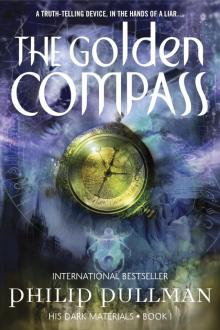 The Golden Compass
The Golden Compass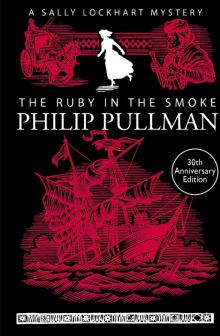 The Ruby in the Smoke
The Ruby in the Smoke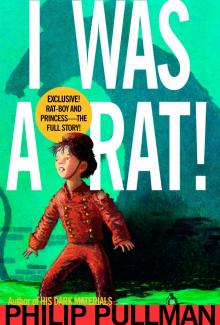 I Was a Rat!
I Was a Rat!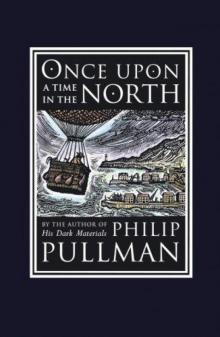 Once Upon a Time in the North
Once Upon a Time in the North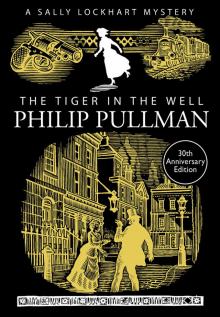 The Tiger in the Well
The Tiger in the Well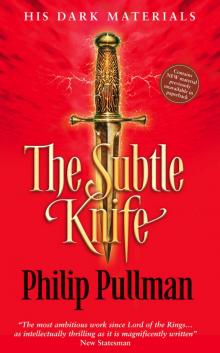 The Subtle Knife
The Subtle Knife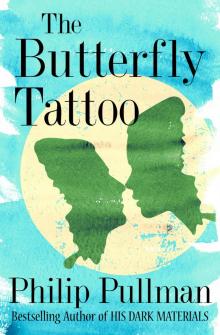 The Butterfly Tattoo
The Butterfly Tattoo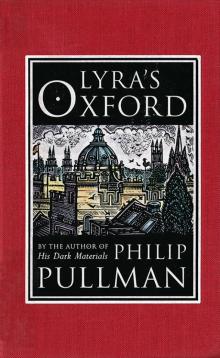 Lyra's Oxford
Lyra's Oxford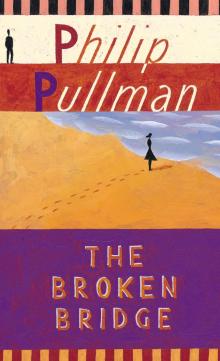 The Broken Bridge
The Broken Bridge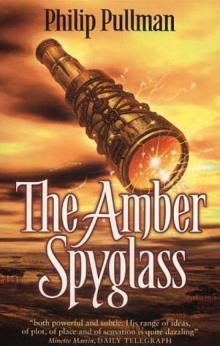 The Amber Spyglass
The Amber Spyglass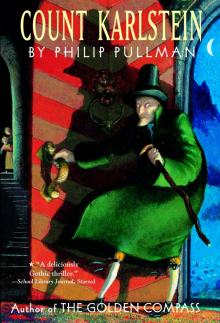 Count Karlstein
Count Karlstein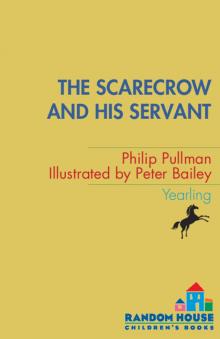 The Scarecrow and His Servant
The Scarecrow and His Servant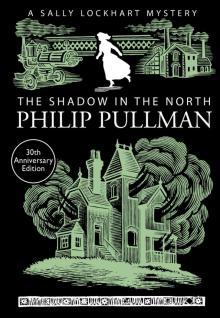 The Shadow in the North
The Shadow in the North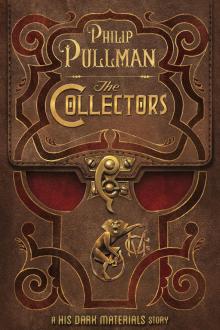 The Collectors
The Collectors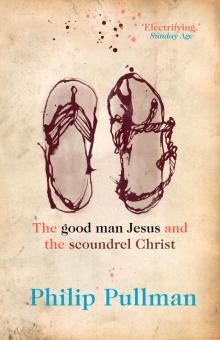 The Good Man Jesus and the Scoundrel Christ
The Good Man Jesus and the Scoundrel Christ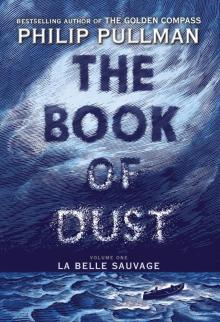 La Belle Sauvage
La Belle Sauvage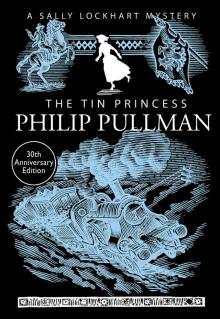 The Tin Princess
The Tin Princess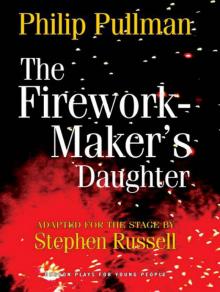 The Firework-Maker's Daughter
The Firework-Maker's Daughter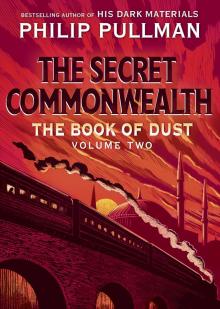 The Book of Dust: The Secret Commonwealth (Book of Dust, Volume 2)
The Book of Dust: The Secret Commonwealth (Book of Dust, Volume 2)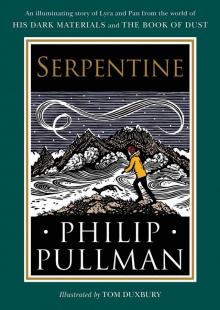 Serpentine
Serpentine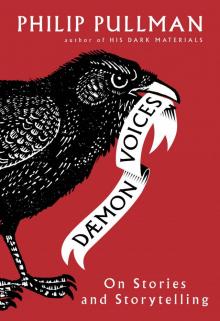 Daemon Voices
Daemon Voices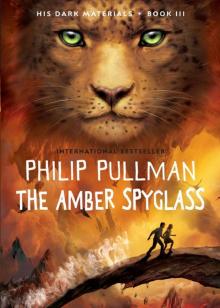 The Amber Spyglass: His Dark Materials
The Amber Spyglass: His Dark Materials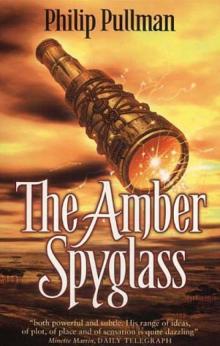 The Amber Spyglass hdm-3
The Amber Spyglass hdm-3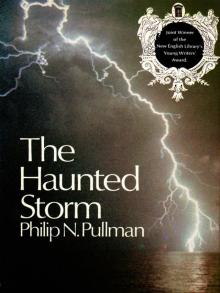 The Haunted Storm
The Haunted Storm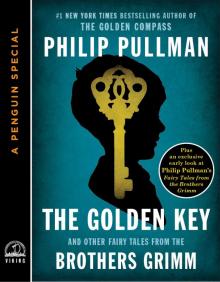 The Golden Key
The Golden Key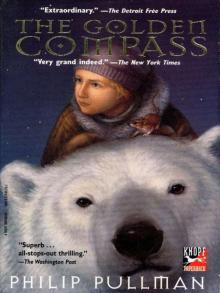 His Dark Materials 01 - The Golden Compass
His Dark Materials 01 - The Golden Compass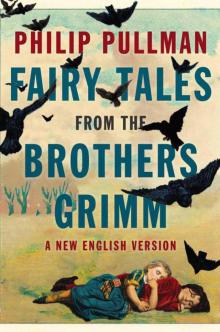 Fairy Tales from the Brothers Grimm: A New English Version
Fairy Tales from the Brothers Grimm: A New English Version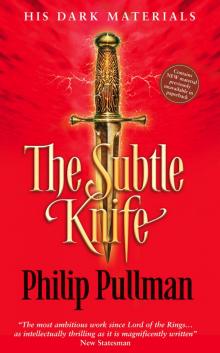 His Dark Materials 02 - The Subtle Knife
His Dark Materials 02 - The Subtle Knife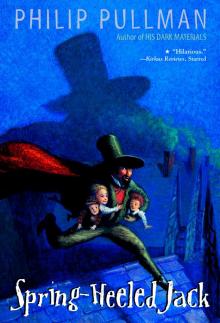 Spring-Heeled Jack
Spring-Heeled Jack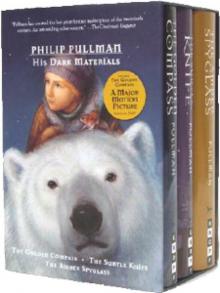 The Golden Compass hdm-1
The Golden Compass hdm-1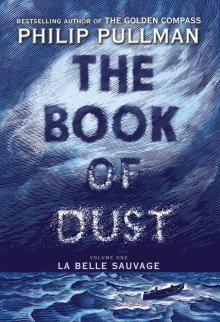 The Book of Dust, Volume 1
The Book of Dust, Volume 1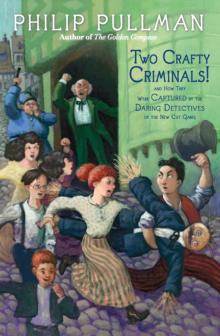 Two Crafty Criminals!
Two Crafty Criminals!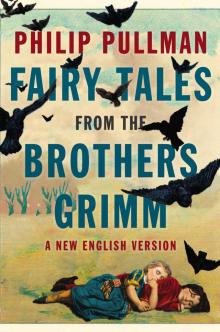 Fairy Tales from the Brothers Grimm
Fairy Tales from the Brothers Grimm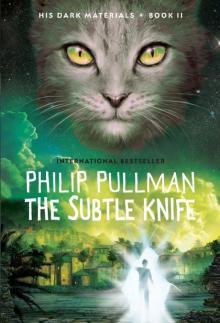 The Subtle Knife: His Dark Materials
The Subtle Knife: His Dark Materials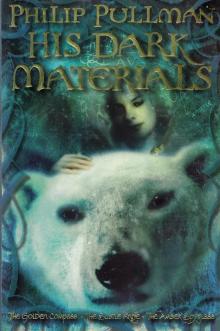 His Dark Materials Omnibus
His Dark Materials Omnibus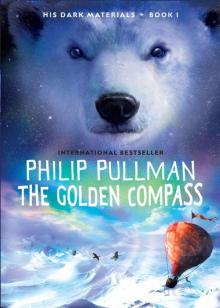 The Golden Compass: His Dark Materials
The Golden Compass: His Dark Materials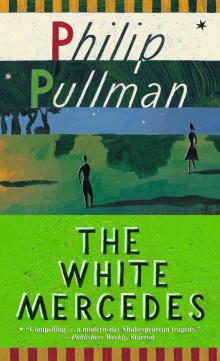 The White Mercedes
The White Mercedes